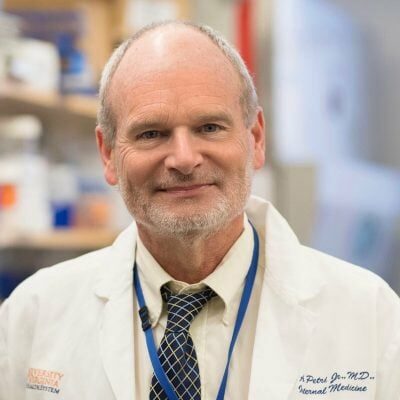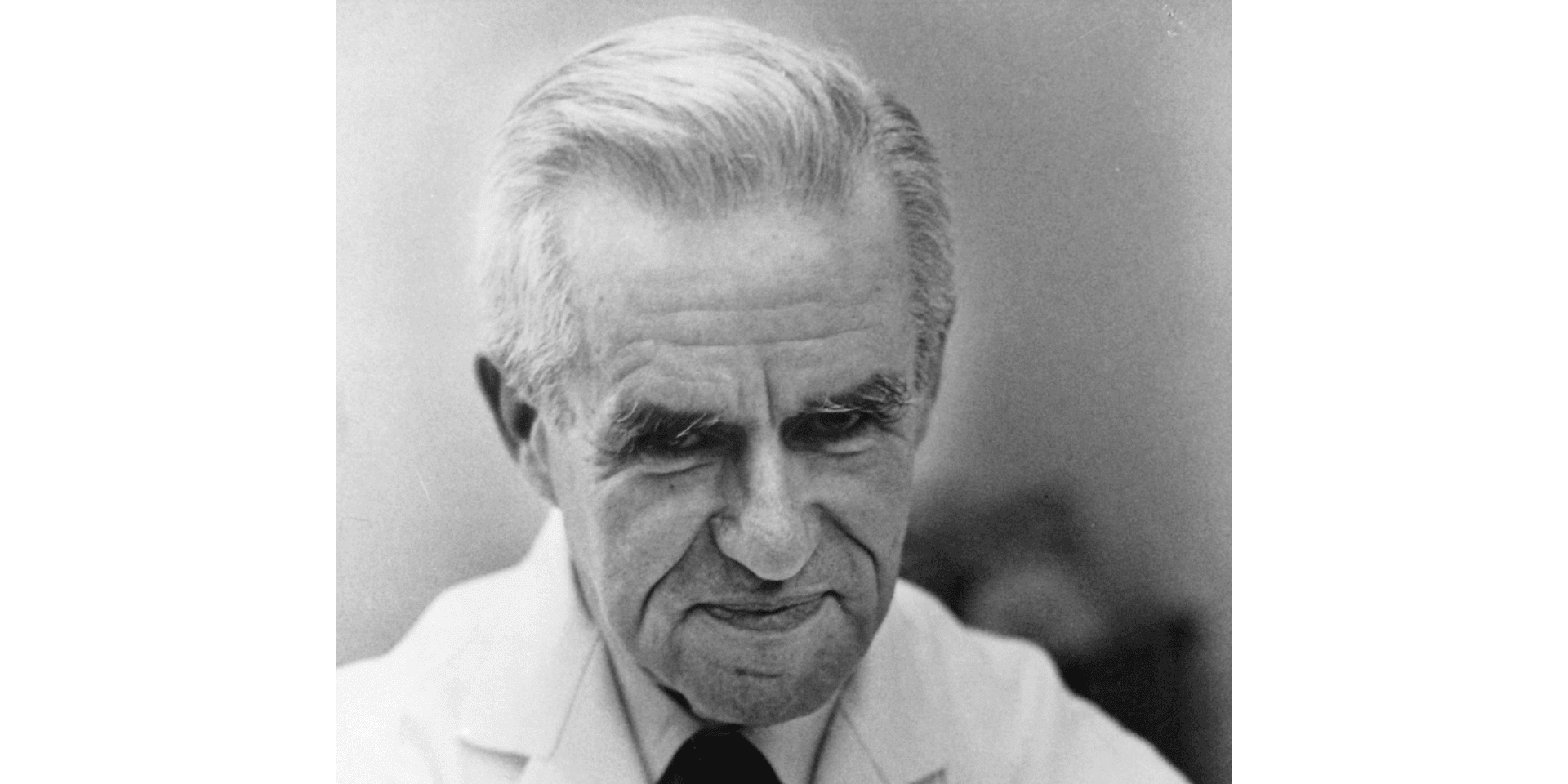The Maxwell Finland Award for Scientific Achievement is presented annually by the National Foundation for Infectious Diseases (NFID) to honor scientists who have made outstanding contributions to the understanding of infectious diseases and public health.
First presented in 1988, the Award is named for Maxwell Finland, MD, a former member of the NFID Board of Directors. Dedicating his life to teaching, clinical research, and patient care, Dr. Finland pioneered work in the diagnosis, treatment, and epidemiology of bacterial infections; the evaluation of antimicrobials; and the demonstration of the evolving problem of antimicrobial resistance. He was a driving force in shaping infectious disease training programs in the United States and in defining the discipline of infectious diseases as we know it today.
William A. Petri, Jr., MD, PhD, vice chair for research and former chair of the Division of Infectious Diseases and International Health at the University of Virginia Department of Medicine, is the recipient of the 2021 Maxwell Finland Award for Scientific Achievement in recognition of his seminal discoveries of the mechanisms that gut microbes use to evade and exploit the microbiota and mucosal immune system, leading to innovative approaches to diagnose and treat diarrheal diseases and prevent their collateral damage on child growth and development. Dr. Petri is an internationally renowned scientist and a pioneer in the study of enteric infections. Amidst the COVID-19 pandemic, Dr. Petri has discovered in humans an immune response that is associated with severe SARS-CoV-2 infection and has gone on to demonstrate the potential for immunotherapy in a mouse model. In presenting the 2021 Maxwell Finland Award for Scientific Achievement to Dr. Petri, NFID recognizes his role as the world’s premier investigator on diarrhea as well as a consummate physician-scientist and leader. He personifies the lifelong dedication to outstanding research, patient care, and teaching that Dr. Finland so exemplified.
An Interview with Bill Petri
What is your greatest professional accomplishment?
The success of the students and fellows who have trained in our lab. There is nothing more satisfying professionally than seeing their discoveries and the development of their careers and their personal lives.
What is the greatest challenge you have faced in your career?
Learning how to best interact with and help each person who comes into our lab. Each person is unique and presents a challenge in identifying the best way to work with them and support them. I often reflect that I have only solved this puzzle by the time someone is graduating from the lab.
Describe a specific project or situation that has had a profound impact on you to this day
Our lab’s response to the coronavirus epidemic has been fabulous. Since March of 2020, we have made a unique observation in patients with COVID-19 that a type 2 IL-13 mediated immune response is associated with respiratory failure, gone on to demonstrate that IL-13 neutralization protects a mouse from SARS-CoV-2, received an Investigational New Drug Application (IND) from the Food and Drug Administration to test an IL-13 inhibitor in patients, and will complete a clinical trial by year end. This has been led by my student Allie Donlan, PhD, and made possible because of the support of colleagues, students, and friends at the University of Virginia and internationally.
I have also cared for patients with COVID-19 in the trenches, so to speak, of our COVID-19 inpatient unit, and made a major effort in public education through writings and Q&As that have been published locally and internationally. To be able to respond as a scientist through discovery, as a physician through the care of patients with COVID-19, and as a public educator has been my greatest satisfaction professionally.
Who has had the greatest impact on your professional career development and what inspired you to work in the field of infectious diseases?
Barbara Mann has selflessly supported me as a colleague and friend for my entire career and I would not enjoy the success I have today without her. Gerald Mandell demonstrated to me how to be a physician-scientist by balancing these two careers, and how to lead a Division of Infectious Diseases by enabling others to be successful. Dick Guerrant made evident to me the importance of infections in children in the developing world. Rashidul Haque gave me the opportunity to work in Bangladesh, something that continues today. I was inspired to work in the field of infectious diseases because I admired the people who worked in the profession.
Who do you most admire, and why?
My parents. They lived lives of affirmation, of service to others, and of professional excellence, while nurturing four children who felt supported to make their own journeys in every moment of their lives.
Recognizing the challenges that we face, both as a nation and as a global community, what are the greatest threats and opportunities for the infectious disease profession?
Health inequality is holding us back as a society. Locally, we see this in the disproportionate impact of the pandemic on the Black and Latinx communities, and globally with unequal access to life-saving COVID-19 vaccines. Mixed in with this is the second problem of politicization or lack of trust in science that has hindered vaccination and treatment.
What are the greatest changes you have seen in the profession since you began your career?
The new ideas and ways of doing things, and opportunities for young people to establish themselves in our profession. I think of vaccines based on mRNA or adenoviruses, understanding of individual susceptibility to infection (such as the CCR5 mutation that makes one nearly invulnerable to HIV infection or sickle cell disease that protects from falciparum malaria), targeted antiviral therapy that cures hepatitis C virus, and understanding how we as people have co-evolved with the microorganisms in our gut to become who we are in an infinitely complex way.
Knowing what you know now, what, if anything, would you do differently in your professional life? Any regrets?
I regret every time I have put my own interests ahead of those of one of my trainees or colleagues.
What most keeps you up at night?
The science more so than the medicine parts of my career.
What advice do you have for the next generation of infectious disease professionals?
Realize that each of us can and should contribute to new knowledge. We practice medicine and enjoy our society through generations of physicians and scientists who have preceded us with advancement and discoveries, and are therefore obligated to pay this back, and going forward to benefit our children and grandchildren.
Medicine and science are the most fulfilling professions one could possibly hope for. To be able to provide care, teach the next generation, and learn and discover new things literally every day is unimaginably satisfying.


